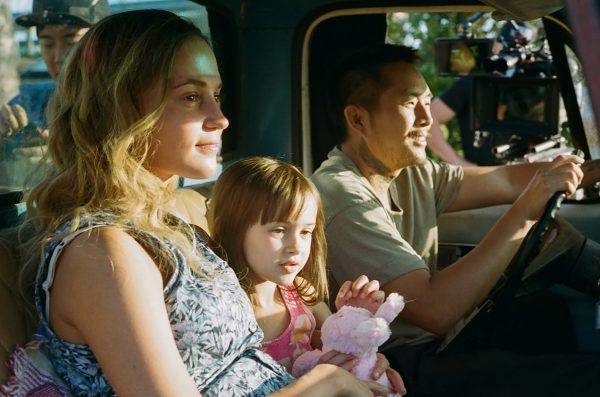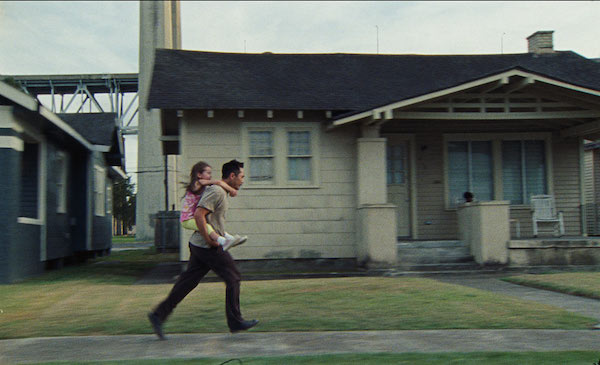Film Review: “Blue Bayou” — “I’m Going Back Someday…”
By Ezra Haber Glenn
Blue Bayou’s story deserves to be told and heard. But rather than focus slowly and intently on its central crisis, the script kneads in a dizzying array of additional threads and sidelines.
Blue Bayou, written and directed by Justin Chon. Screening at Kendall Square Cinema and Coolidge Corner Theater

Alicia Vikander, Sydney Kowalske, and Justin Chon on the set of Blue Bayou.
The initial shock is a pleasant one, more surprising than unsettling: a pitch-perfect Louisiana drawl flowing smoother than a lazy river across the words of Antonio LeBlanc, a tattoo artist, loving husband, and doting stepdad living just outside New Orleans. What’s surprising — indeed refreshing, and sadly, almost profound — is that LeBlanc is Korean by birth: he was adopted as a baby from a land he never knew. Visually, he looks just like the characters we are so accustomed to seeing as hardworking immigrants speaking broken English (or worse, cast only as “Asian gangster #1”). But, because too many of us are unaccustomed to examining the arbitrary relationships between race, nationality, language, and culture, viewers may be caught off guard by LeBlanc’s accent, and by association, everything else about him. (The director is banking on us feeling this apparent incongruence, as he explains in an open letter accompanying the release.)
Despite his non-Caucasian appearance, LeBlanc (“the white” — get it?) is as American as fried pork rinds and cheap beer from the Piggly Wiggly. (Yes, you are picking up an important class dynamic at play: to be a “real American” here means being working class.) Our hero is played with gusto by the film’s writer/director Justin Chon, who previously directed, wrote, and starred in 2017’s historical drama, Gook, which also explored complex aspects of race and ethnicity in America. (He’s also in the Twilight series, has his own line of clothing stores, and sings in a K-pop parody group — a real Renaissance man!)
Unlike other adoption stories, Blue Bayou is no quest to find a forgotten heritage or to reunite with an estranged parent. Unlike immigration stories, it is not a tale of struggling to fit in, or longing for some lost “home.” From the outset, LeBlanc is comfortable in his skin and at home in New Orleans. He knows who he is — a regular working class American guy from Louisiana — and he just wants to live the life that status entails: he wants to find the girl, get a good job, be a good dad, settle down, and ideally stop stealing motorcycles (did I mention he is an ex-con?).
The problem arises when, after an unfortunate run-in with a cop who also happens to be his wife’s ex (Mark O’Brien), it is discovered that his citizenship status is in question. The procedures governing international adoptions were fuzzier in the past and file-keeping was haphazard. The family that originally brought LeBlanc to the States abandoned him to a sequence of foster parents, for whom paperwork was not a top priority. In the notes for the film (and, a bit obviously, in the exposition of the family’s lawyer, played with earnest frustration by Vondie Curtis-Hall), we learn that as many as 49,000 people adopted between WWII and the late ’90s may fall into this Kafkaesque immigration limbo. Some have actually been deported, despite having lived for decades as Americans.
The result is a classic “coming to America” narrative turned on its head: there’s really no immigrant here at all, just a guy who by all accounts should be an American, being denied his basic rights. It’s the anti-Minari: rather than featuring a Korean protagonist trying to make a life as an American, it features an American protagonist trying not to be viewed as Korean. (So maybe not the opposite — is that what logicians call the “contrapositive”…?)
It’s a great story, and one that deserves to be told and heard. But rather than focus slowly and intently on its central crisis, the script kneads in a dizzying array of additional threads and sidelines. An ex-con from a string of broken homes finally finds love and a stable family, but his attempts to stick to the straight-and-narrow are frustrated when no one wants to give him a second chance. A woman dying of cancer (Linh Dan Pham) befriends a young tattoo artist, hoping for final moments of human connection and beauty before she shuffles off this mortal coil. A vulnerable kid has finally learned to trust again, but fears that her new stepdad will forget about her when a new sibling is born. A hard-working mother (Alicia Vikander) struggles to keep her daughter safe from an ex-husband with a temper, but it can be tough when your ex is a cop. A visit to an estranged parent dredges up a suppressed history of childhood trauma. And, on top of all of this, the major struggle: Antonio faces deportation for nothing more than a sloppy adoption process dating back 30 years.

Sydney Kowalske and Justin Chon in Blue Bayou.
When the waves of confrontation and catharsis eventually come crashing in from all this, it begins to feel as if the filmmakers purchased Oscar clips in an oversize family pack at Costco. All together, it’s just too much. The structure has slipped from tearjerker to gut-wrencher to overwrought melodrama. Alone, any one of these plotlines would have been more than enough drama to fill an excellent two-hour human-interest movie in the neorealist tradition. But when it’s all laid on so thick and moves along at such a hurried pace, the result feels less real, less intimate, less human.
In terms of characters, there is real potential here, which could have been looked into more closely: it’s possible to do more with less. The early scenes establish some wonderful warmth between LeBlanc and his stepdaughter Jesse, played by Sydney Kowalske (remember that name, this kid has real acting chops), which would have benefited from more development throughout. And, although the reveal is a bit hurried and the emotional journeys given short-shrift, some of the baddies turn out to have good sides (or at least human vulnerabilities to explain their failings), which is refreshing. On the other hand, one stereotypically racist southern cop (Emory Cohen) is pretty one-dimensional, somewhere between stock villain and joke-butt.
Along the way, there are some master strokes, including a visually poetic sequence that delights in the silent dance of a crew of chop-shop artists working deep through the night to dismantle a haul of rustled motorcycles. The film’s opening shot is stunning as well, blending classical Korean and Bayou aesthetics in a draping, lacy, purple-hued fine-art painting in celluloid. Less impressive are the overplayed “dreamlike” underwater scenes of LeBlanc’s memory and fantasy, as he reflects on the parallels, contrasts, and echoes connecting his life-choices with his imagined birth mother.
Ezra Haber Glenn is a Lecturer in MIT’s Department of Urban Studies & Planning, where he teaches a special subject on “The City in Film.” His essays, criticism, and reviews have been published in The Arts Fuse, CityLab, the Journal of the American Planning Association, Bright Lights Film Journal, WBUR’s The ARTery, Experience Magazine, the New York Observer, and Next City. He is the regular film reviewer for Planning magazine, and member of the Boston Society of Film Critics. Follow him on https://www.urbanfilm.org and https://twitter.com/UrbanFilmOrg.
